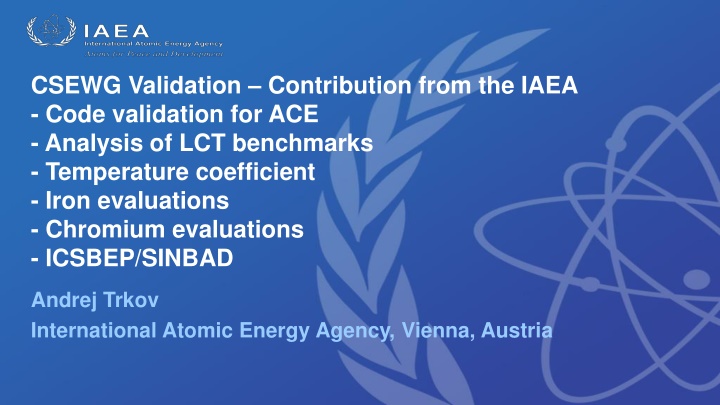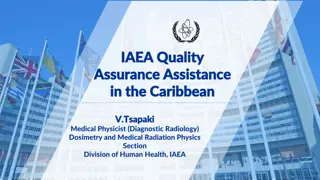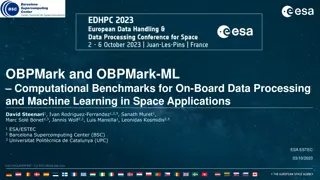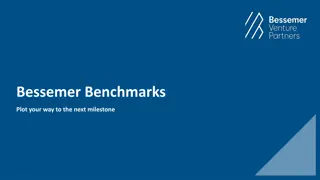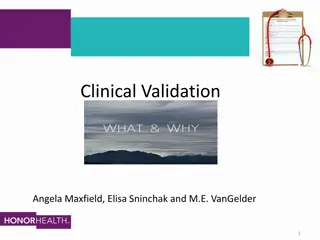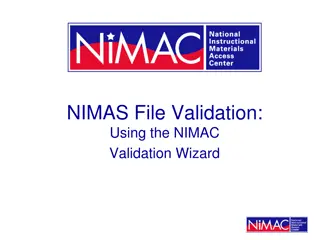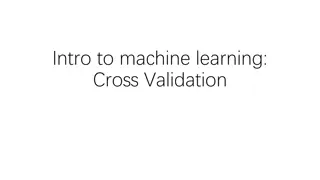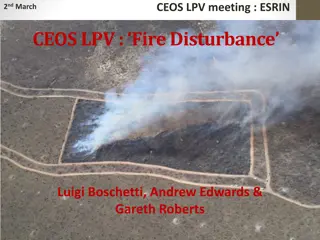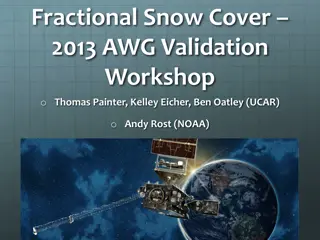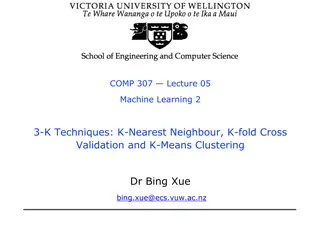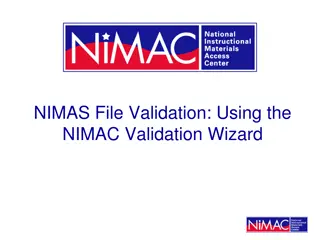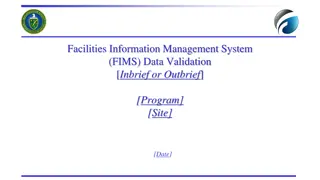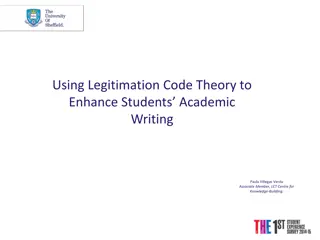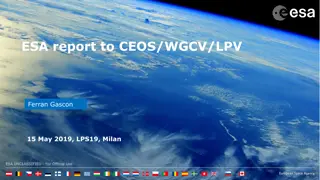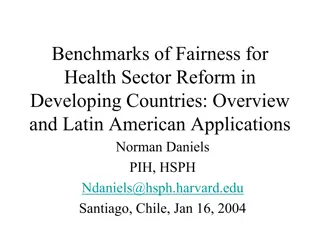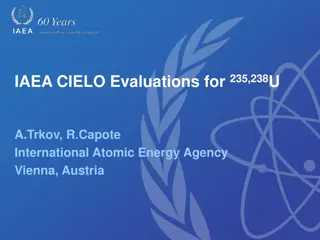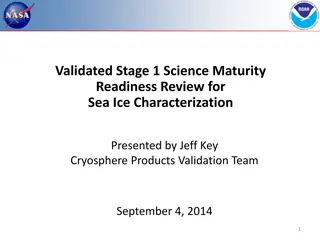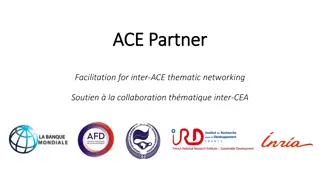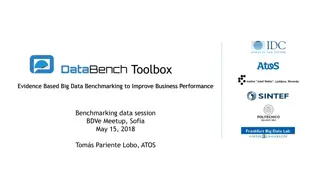IAEA Contributions: ACE Code Validation & Analysis of LCT Benchmarks
The International Atomic Energy Agency (IAEA) has made significant contributions to the verification of ACE libraries, including code validation, analysis of LCT benchmarks, temperature coefficient assessments, iron and chromium evaluations, and participation in ICSBEP/SINBAD activities. Various codes capable of generating ACE files are highlighted, along with key nuclear data processing reports and benchmarks. Explore the advancements in nuclear data analysis and validation facilitated by the IAEA.
Download Presentation

Please find below an Image/Link to download the presentation.
The content on the website is provided AS IS for your information and personal use only. It may not be sold, licensed, or shared on other websites without obtaining consent from the author.If you encounter any issues during the download, it is possible that the publisher has removed the file from their server.
You are allowed to download the files provided on this website for personal or commercial use, subject to the condition that they are used lawfully. All files are the property of their respective owners.
The content on the website is provided AS IS for your information and personal use only. It may not be sold, licensed, or shared on other websites without obtaining consent from the author.
E N D
Presentation Transcript
CSEWG Validation Contribution from the IAEA - Code validation for ACE - Analysis of LCT benchmarks - Temperature coefficient - Iron evaluations - Chromium evaluations - ICSBEP/SINBAD Andrej Trkov International Atomic Energy Agency, Vienna, Austria
Scope Report from the code-validation exercise for ACE libraries Analysis of ICSBEP LEU-COMP-THERM benchmarks Impact of U-235 on the temperature coefficient. Iron evaluations Chromium evaluations News from ICSBEP/SINBAD CSEWG Data Validation 4-8/09/2019 2
Code validation for generating ACE files Background: IAEA Member States expressed desire to have a processing code independent of NJOY IAEA initiated an activity to develop a module for generating ACE files as a supplement to PREPRO ACEMAKER Other codes with ACE capability were developed/announced In the meantime, NJOY became open source CSEWG Data Validation 4-8/09/2019 3
Code validation for generating ACE files Nine (9) codes have the capability to generate ACE files for neutrons above the thermal energy range NJOY USA FUDGE - USA GRUCON Russia FRENDY Japan ACEMAKER/PREPRO IAEA NECP-Atlas China RULER China GAIA France GALILEE- France CSEWG Data Validation 4-8/09/2019 4
No. ICSBEP Label Short name Common name -------------------------------------------------------- 1 HEU-MET-FAST-001 hmf001 Godiva 2 HEU-MET-FAST-002 hmf002-002 Topsy-002 3 HEU-MET-FAST-003 hmf003-001 Topsy-U_2.0in 4 HEU-MET-FAST-003 hmf003-002 Topsy-U_3.0in 5 HEU-MET-FAST-003 hmf003-003 Topsy-U_4.0in 6 HEU-MET-FAST-003 hmf003-010 Topsy-W_4.5in 7 HEU-MET-FAST-003 hmf003-011 Topsy-W_6.5in 8 HEU-MET-FAST-014 hmf014 VNIIEF-CTF-DU 9 HEU-MET-FAST-032 hmf032-001 COMET-TU1_3.93in 10 HEU-MET-FAST-032 hmf032-002 COMET-TU1_3.52in 11 HEU-MET-FAST-032 hmf032-003 COMET-TU1_1.742in 12 HEU-MET-FAST-032 hmf032-004 COMET-TU1-0.683in 13 IEU-COMP-FAST-004 icf004 ZPR-3/12 14 IEU-MET-FAST-007 imf007 Big_Ten(s) 15 IEU-MET-FAST-007 imf007d Big_Ten(detailed) 16 IEU-MET-FAST-010 imf010 ZPR-6/9(U9) 17 IEU-MET-FAST-012 imf012 ZPR-3/41 18 IEU-MET-FAST-013 imf013 ZPR-9/1 19 IEU-MET-FAST-014 imf014-002 ZPR-9/2 20 IEU-MET-FAST-022 imf022-001 FR0_3X-S 21 IEU-MET-FAST-022 imf022-002 FR0_5-S 22 IEU-MET-FAST-022 imf022-003 FR0_6A-S 23 IEU-MET-FAST-022 imf022-004 FR0_7-S 24 IEU-MET-FAST-022 imf022-005 FR0_8-S 25 IEU-MET-FAST-022 imf022-006 FR0_9-S 26 IEU-MET-FAST-022 imf022-007 FR0_10-S 27 MIX-MISC-FAST-001 mif001-001 BFS-35-1 28 MIX-MISC-FAST-001 mif001-002 BFS-35-2 29 MIX-MISC-FAST-001 mif001-003 BFS-35-3 30 MIX-MISC-FAST-001 mif001-009 BFS-31-4 31 MIX-MISC-FAST-001 mif001-010 BFS-31-5 32 MIX-MISC-FAST-001 mif001-011 BFS-42 TM on Nuclear Data Processing 23-26 Sept. 2019
Importance of Self-Shielding TM on Nuclear Data Processing 23-26 September 2019
CSEWG Data Validation 4-8/09/2019 7
Conclusions on ACE Library Validation Without self-shielding, all codes are capable of generating ACE files that produce results within 20 pcm (~10 pcm convergence criterion in MCNP) With self-shielding included in the calculations, the preliminary results are within 100 pcm CSEWG Data Validation 4-8/09/2019 8
ICSBEP LEU-COMP-THERM ICSBEP-2018 contains 97 benchmarks, most of them include several cases At the IAEA, the computational models are available for 338cases (input models obtained from the Handbook, Skip Kahler or otherwise) Some of the benchmarks show huge discrepancies, which can hardly be attributed to nuclear data e80 performance is similar to e71 , except for LCT078, LCT080 and LCT096, where e80 is distinctly worse (see cumulative 2/DoF plot) CSEWG Data Validation 4-8/09/2019 9
CSEWG Data Validation 4-8/09/2019 10
CSEWG Data Validation 4-8/09/2019 11
2-sigma outliers only PNL-1.64cm pitch (LCT003,12) CSEWG Data Validation 4-8/09/2019 12
LCT004 Case-10 with NO Gd impurity is the only one that agrees with the measured k_eff CSEWG Data Validation 4-8/09/2019 13
ICSBEP LEU-COMP-THERM - Rejected LEU-COMP-THERM-003 (PNL_1.64p) (*) LEU-COMP-THERM-004 (PNL_1.89p) (*) LEU-COMP-THERM-009 (PNL_2.54p not an outlier - correlated with LCT010) LEU-COMP-THERM-010 (PNL_2.54p_Pb-1) LEU-COMP-THERM-012 (PNL_1.64p, correlation with LCT003?) (*) LEU-COMP-THERM-022 (RRC-KI-0.70p_hx) LEU-COMP-THERM-024 (RRC-KI-0.62p_hx) LEU-COMP-THERM-025 (RRC-KI-0.80p_sq) LEU-COMP-THERM-027 (Valduc-Pb) LEU-COMP-THERM-042 (Fuel clusters, SS reflector, not an outlier) LEU-COMP-THERM-052 (Valduc hx Gd) LEU-COMP-THERM-064 (VVER_1.27p) Temperature-dependent cases The remainder comprises 207 cases (*) Gd impurity is mentioned, which might not be there? CSEWG Data Validation 4-8/09/2019 14
CSEWG Data Validation 4-8/09/2019 15
ICSBEP LEU-COMP-THERM-078, 080, 096 Why are e80 results lower than e71 ? Processing: swap U-235,238 in e71 with e80b4 processed with ACEMAKER no effect neither processing nor U data are responsible for the difference TSL at room temperature: Swap e80 tsl into e71 library slight increase in reactivity TSL is not responsible for the large difference O-16: Swap O-16 from e80 into e71 performance is degraded Swap O-16 from e71 into e80 performance is restored (see e80_O16 ) Swapping O-16 from JEFF-3.3 instead of e71 makes no difference. Swap elastic cross section below 0.3 MeV from e71 into e80 helps only in cases with softer spectra (see e80_O16a on next slide) Proof that O-16 is the reason for the degraded performance! The problem is not limited to the cross sections in the low-energy range, although soft-spectrum assemblies are affected slightly more CSEWG Data Validation 4-8/09/2019 16
CSEWG Data Validation 4-8/09/2019 17
DICE sensitivities on k_eff for LCT096 cases 1, 19 Case Nuclide Reaction Thermal Epithermal Fast Total LEU-COMP-THERM-096-019 H1 capture -0.1369 -0.0054 0.0000 -0.1423 LEU-COMP-THERM-096-001 H1 capture -0.0744 -0.0048 0.0000 -0.0792 LEU-COMP-THERM-096-001 O16 elastic -0.0014 0.0206 0.0734 0.0926 LEU-COMP-THERM-096-001 H1 elastic -0.0199 0.2774 0.2018 0.4593 LEU-COMP-THERM-096-019 H1 elastic -0.0610 0.2199 0.2065 0.3654 LEU-COMP-THERM-096-019 O16 elastic -0.0036 0.0192 0.0692 0.0848 LEU-COMP-THERM-096-001 Al27 elastic -0.0005 0.0035 0.0140 0.0170 LEU-COMP-THERM-096-019 Al27 elastic -0.0003 0.0027 0.0111 0.0135 CSEWG Data Validation 4-8/09/2019 18
HEU-SOL-THERM O-16 impact on ATLF Flat dependence on ATLF of HST was one of the constraints for ENDF/B-VIII.0 Swapping O-16 from ENDF/B-VII.1 increases the reactivity bias and increases the gradient slightly, but not excessively CSEWG Data Validation 4-8/09/2019 19
CSEWG Data Validation 4-8/09/2019 20
Coefficients of the polynomial fit Parameter Library Coefficients k-eff e71 4.83E+1 -2.21E+2 k-eff jeff33 -1.56E+2 4.35E+2 k-eff e80 -1.95E+1 -7.68E+1 k-eff e80_O16 5.59E+1 1.09E+2 CSEWG Data Validation 4-8/09/2019 21
Temperature Coefficient due to U-235 Oscar Cabellos showed a potentially alarming plot of a reactivity decrease with increasing enrichment using ENDF/B-VIII.0 data for the Mosteller pin-cell benchmark (~600 pcm at 5% enr.) The plot shows there is a difference between e80 and e71 , but it does not say which one is less wrong. Candidate benchmarks for temperature coefficient: HCT016: IGR-graphite up to T=600 deg.C LCT026: IPPE-MATR (water) up to T=~231 deg.C There are more benchmarks in ICSBEP with lower span of T KRITZ (KRITZ-1 = LEU-COMP-THERM-104, to be included in the next release of ICSBEP) CSEWG Data Validation 4-8/09/2019 22
CSEWG Data Validation 4-8/09/2019 23
Slide by Y. Danon at the 2018 INDEN Meeting CSEWG Data Validation 4-8/09/2019 24
Temperature coefficient (Cont.) HCT016: Need ACE files at high temperature, ACE Fast and TSL have different temperature grids Ambiguity about which graphite TSL to use KRITZ: WIMS-D (1D/buckling) quick test (contributed by O. Cabellos) does not show any degraded performance of ENDF/B-VIII.0 KRITZ-1 will be in ICSBEP LEU-COMP-THERM-104, but not in 2019 edition (private communication with Dennis Mennerdahl shows no clear indication of ENDF/B-VIII.0 deficiency). CSEWG Data Validation 4-8/09/2019 25
Temperature coefficient (Cont.) LCT026: Light water array up to ~200 deg.C (=~480 K) e80 calculation done at 293.6K and 600 K K_eff interpolated as 1/sqrt(T) Flat prediction of reactivity with e71 and e80 There is no observable difference with respect to temperature effects between e71 and e80 in this benchmark CSEWG Data Validation 4-8/09/2019 26
CSEWG Data Validation 4-8/09/2019 27
Iron cross sections CIELO=ENDF/B-VIII.0 evaluation Inelastic cross sections from Geel by Negret Leakage spectra from thick spheres with 252Cf source are under- predicted by up to 40% from 2 MeV to 6 MeV (shown by Simakov just before the release of ENDF/B-VIII.0) Patch to the Fe-56 is available that Shows good performance in leakage spectra from thick spheres Removes some deficiencies (e.g. near 300 keV) New resonance evaluation is needed (some progress was made with L. Leal, including direct capture contribution) CSEWG Data Validation 4-8/09/2019 28
CSEWG Data Validation 4-8/09/2019 29
Chromium cross sections There is a problem with the ~5 keV resonances in 50,53Cr Raw measurements from ORNL/JRC and RPI agree in shape, but differ strongly after multiple scattering corrections ZPR-6/10 benchmark is highly sensitive to Cr cross sections near 5 keV New measurement is needed to resolve the discrepancy in measured data? (e.g. Lead-Slowing-Down measurement) CSEWG Data Validation 4-8/09/2019 30
News from ICSBEP (from J. Bess) ICSBEP Handbook available Sep 2019 IRPhEP Handbook available Dec 2019 Key benchmarks of interest to nuclear data: LCT099 Ti cross section LCT103 U7Mo (~20% 235U) plates KRITZ-LWR-RESR-004 Rod lattices 20 250 C MSRE-MSR-RESR-001 Molten salt & graphite TREAT-FUND-RESR-002 Graphite & hydrogen sensitivity in fuel See additional slide-pairs on the CSEWG 2019 web site for more information 31
Conclusions Code validation for ACE was successful (9 codes) LEU-COMP-THERM-078, 080, 096 benchmarks show sensitivity to oxygen data Lower elastic cross sections below 0.3 MeV in e80 are only partly responsible for the negative bias in reactivity Higher absorption cross sections in e80 (e.g. the alpha- emission) most probably affect assemblies with harder spectra Before re-tuning ENDF/B-VIII it is essential to sort out the oxygen cross sections in the MeV energy region CSEWG Data Validation 4-8/09/2019 32
Conclusions (Cont.) Strong decrease of reactivity at higher temperatures as a function of enrichment with ENDF/B-VIII.0 data shown by O. Cabellos was alarming Preliminary analysis of LCT026 benchmark (up to 231 deg.C) does not show any degraded performance of ENDF/B-VIII.0 More data testing is needed. Patched to 56Fe were made, new resonance evaluation is warranted Problems with 50,53Cr resonance remain, new measurement is needed to resolve contradicting measurements New release of ICSBEP and IRPhE handbooks CSEWG Data Validation 4-8/09/2019 33
